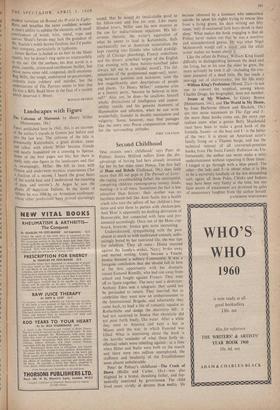Second Childhood
'ONE invents one's childhood,' says Peter de Polnay; Jessica Mitford suffers from the dis- advantage of having had hers already invented for her by her elder sister Nancy. The first half of Hons and Rebels (Gollancz, 18s.) does little more than fill out gaps in The Pursuit of Love: the raging, swashbuckling father, the sentimental, conspiring children; running-away money, feuds, hunting—it is all there. Sometimes ,the fact is less attractive than fiction : their mother was no harmless dumb-bell like Aunt Sadie, but a health crank who tore the splints off her children's frac- tures and sent them to parties with chicken-pox. And 'Hon' is apparently no dashing derivation of Honourable, but connected with hens and pro- nounced accordingly. Once out of the Hons cup- board, however, Jessica gets more interesting.
Undereducated, .sympathising with the poor almost as much as with maltreated animals, suffo- catingly bored by her restricted life, she was ripe for rebellion. They all were: Diana married against the family's wishes, Nancy broke away and started writing, Unity became a Fascist, Jessica became a solitary Communist. It was a foregone conclusion that she should fall in love at the first opportunity with her dramatic cousin Esmond Romilly, who had run away from school and fought against Franco. They went off to Spain together. The navy sent a destroyer; Anthony Eden sent a telegram; they could not be persuaded to return. They married, but as celebrities they were now an embarrassment to the International Brigade, and reluctantly they came back, to lead a life of romantic squalor in Rotherhithe and dodge the electricity bill : it had not occurred. to Jessica that electricity did not pour forth freely,, like water. After a while they went to America and kept a bar in Miami until the war, in which Esmond was killed. What is interesting about the book is the horrific reminder of what these hotly in- effectual rebels were rebelling against : at a time when Hitler and Stalin were both on the march and there were two million unemployed, the stuffiness and insularity of the Establishment seem almost unbelievable.
Peter de Polnay's childhood—The Crack of Dawn (Hollis and Carter, 18s.)—was also blighted by a brutal, thrashing father, and fan- tastically restricted by governesses. The child lived more vividly in dreams than reality. He became obsessed by a footman who committed suicide; he spent his nights trying to rescue him from a living grave, his days writing out fifty times, 'only ill-mannered little boys shriek in their sleep.' What makes the book engaging is that de Polnay never makes out that he was a sensitive and misunderstood genius. He was what Nigel Molesworth would call a weed; and the adult writer makes no bones about it.
Like the infant de Polnay, William King found difficulty in distinguishing between the dead and the living, but in his case the older he grew, the more seriously he took it all—including the con- stant presence of a dead twin. He has made a nest-egg out of clairvoyancy, but his life story —William King's Profession (Blond, 21s.)—is not one to convert the sceptical, among whom Charles Drage, his biographer, does not number.
Swans at My Window, by Ginny Brown (Heinemann, 16s.), and The World in My House, by Joan Harborne (Hurst and Blackett, I5s.) are two more successors to The Egg and I: the more these books come out, the more one realises anew what a genius Betty, Macdonald must have been to make a good book of the formula. Swans—or the boat and I—is the better of the two; it is about an American actor's family living on a Thames barge, and has the technical interest of all converted-premises books, from The Swiss Family Robinson on. Un- fortunately, the author can never make a witty understatement without repeating it three times:
I longed to go through with a blue pencil. The other—the lads and 1—is about what it is like to be a university landlady of the less demanding sort; again, all those Poles, Chinks and Indians may have been very funny at the time, but any faint snorts of amusement are drowned by gales of unnecessary laughter from the author herself.


































 Previous page
Previous page